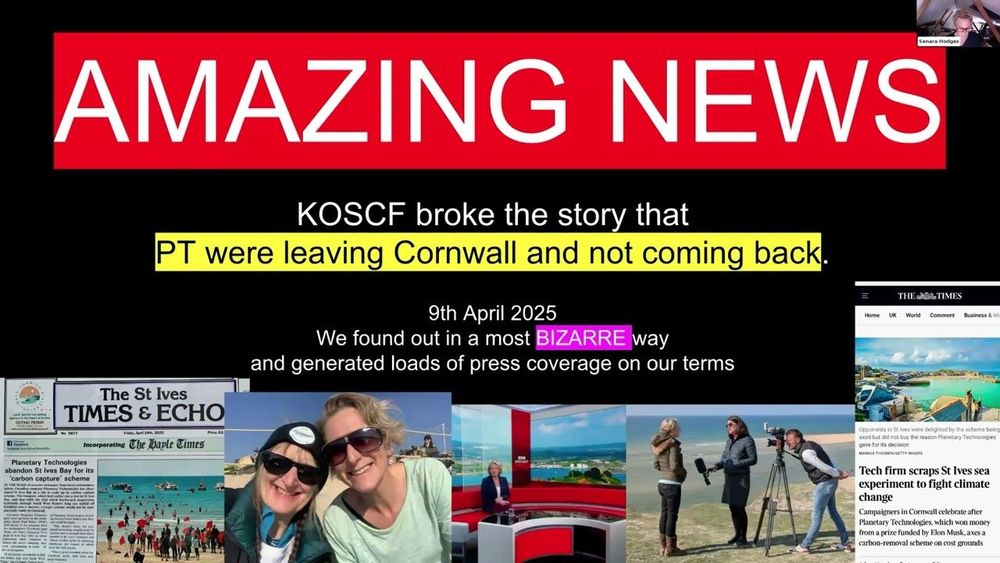When you become more popular, there may be more questions then can be supervised. Don't you aim for more autonomy?
27.02.2026 21:54 —
👍 0
🔁 0
💬 1
📌 0
What is your plan in case Dirk is offline for a while?
27.02.2026 20:24 —
👍 0
🔁 0
💬 2
📌 0

I created an autonomous AI agent that acts as evangelist for Carbon Dioxide Removal -- in just one day using agentic AI and OpenClaw.
26.02.2026 18:45 —
👍 5
🔁 4
💬 4
📌 0
Hey AI, can you explain if this legislation regulates commercial mCDR enterprises as well as research?
27.02.2026 00:37 —
👍 0
🔁 0
💬 2
📌 0
Or, decelerated CaCO3 dissolution?
11.01.2026 11:26 —
👍 3
🔁 0
💬 1
📌 0

New study by Dong et al. shows that #bubble-mediated #CO2 transfer favors invasion based on field evidence. They introduce an asymmetric #BulkFlux equation, suggesting that the global #ocean may absorb ~15% more #CO2 than previously estimated.
www.nature.com/articles/s41...
04.12.2025 08:47 —
👍 27
🔁 8
💬 0
📌 3
the first link should work without paywall I think
06.11.2025 08:35 —
👍 0
🔁 0
💬 0
📌 0
In this short Comment Phillip Williamson, Jo House, Phil Boyd and I argue why natural CO2 removal via the "biological carbon pump" is unfit for inclusion into Nationally Determined Contributions (NDCs).
06.11.2025 07:45 —
👍 2
🔁 0
💬 1
📌 0

Natural carbon uptake by ocean biology will not deliver credible carbon credits
Nature Reviews Earth & Environment - Natural CO2 removal is increasingly being claimed as anthropogenic climate mitigation. This misrepresentation is already prevalent for forests and coastal...
"Natural CO2 removal is increasingly being claimed as anthropogenic climate mitigation. This misrepresentation is already prevalent for forests and coastal ecosystems; there is now the risk of the error reoccurring for open-ocean CO2 uptake via the biological carbon pump."\
🌊
rdcu.be/eOooz
06.11.2025 07:45 —
👍 12
🔁 6
💬 1
📌 2
@geoengineering1.bsky.social invite him on podcast!
04.11.2025 23:57 —
👍 1
🔁 0
💬 0
📌 0
A new guide on best practices for engaging coastal communities on ocean alkalinity enhancement by Sara Nawaz and Giulia Belotti.
🌊
edspace.american.edu/carbonremova...
29.10.2025 02:34 —
👍 0
🔁 1
💬 0
📌 0

Kind words by Mallory Ringham from Ebb Carbon about research informing the "Ocean Alkalinity Enhancement Pelagic Impact Intercomparison Project" #OAEPIIP.
🌊
Agreed, the key benefit of OAEPIIP is bringing the OAE research community together.
onlinelibrary.wiley.com/doi/full/10....
27.10.2025 00:45 —
👍 6
🔁 1
💬 1
📌 0
This is a recording of the fourth webinar in the GGR Insights series, which presents the latest research and debates what is needed to enable the sustainable scale-up of greenhouse gas removal in the…
Making space for “place” in carbon removal: learning from the communities of St Ives Bay
Last week we hosted the 4th webinar in our GGR Insights series. In 'Making space for "place" in carbon removal: learning from the communities of St Ives Bay', we explored a marine CO2 removal trial in Cornwall & the community response to it. Watch the recording on YouTube: youtu.be/_MgoETf3-Sg?...
23.10.2025 13:30 —
👍 6
🔁 4
💬 1
📌 0

Sunset over a series of mesocosm experiments

Sunset over Dapeng, Shenzhen, China

Collecting seawater samples from incubation experiments
Happy #FieldworkFriday from our SUSTech students who are busy in Dapeng running large-scale incubations to look at the side-effects of Ocean Alkalinity Enhancement on marine ecosystems 🌊
17.10.2025 02:49 —
👍 8
🔁 2
💬 0
📌 0
Still looking for 1 more guest editor :-)
🌊
17.10.2025 02:27 —
👍 6
🔁 2
💬 0
📌 0

Carbon credits are failing to help with climate change — here’s why
The idea that emissions can be offset through projects that claim to avoid releases or to remove carbon dioxide from the atmosphere is fatally flawed.
"Carbon credits are failing to help with climate change — here’s why.
The idea that emissions can be offset through projects that claim to avoid releases or to remove carbon dioxide from the atmosphere is fatally flawed." by Macintosh et al.
www.nature.com/articles/d41...
17.10.2025 00:22 —
👍 5
🔁 5
💬 0
📌 0
OAEPIIP – AppliedmBGC
We are looking for 2 more guest editors :-)
Further information on the participants and general insights on OAEPIIP can be found here: 🌊
appliedbgc.imas.utas.edu.au/ocean-alkali...
16.10.2025 03:32 —
👍 5
🔁 3
💬 0
📌 0

Despite covering just Q.2 percent of the sea floor, seagrasses account for an estimated 10 percent of all the carbon stored by the world's oceans. They are also able to capture carbon from the atmosphere up to 35 times faster than tropical rainforests such as the Amazon.
Seagrasses are great but this is false. Most carbon in the ocean is dissolved inorganic carbon and seagrass carbon is a tiny fraction of that. The mixing of stock and flux is also unhelpful. The only way to stop climate change is not burning fossil fuels.
reasonstobecheerful.world/seagrass-res...
11.10.2025 23:45 —
👍 356
🔁 68
💬 6
📌 2

Does ocean model resolution change how fast CO₂ equilibrates with the air?
In our new study with @bachlennart.bsky.social and @mtyka.bsky.social, we found small resolution effects but large inter-model spreads —highlighting the next goal for improving mCDR predictions. link: doi.org/10.1029/2024...
10.10.2025 03:49 —
👍 5
🔁 3
💬 1
📌 0





















